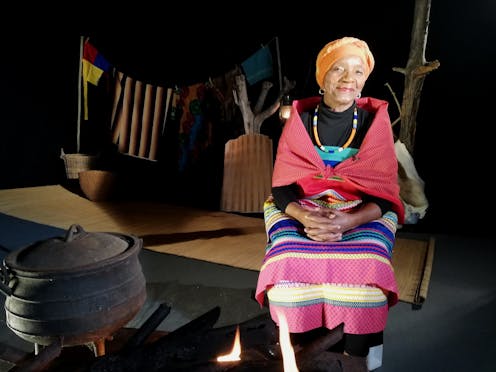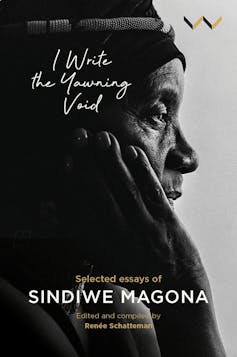
Sindiwe Magona – who turns 80 this year – is a celebrated South African writer, storyteller, speaker and activist. In 2022 Magona, once a domestic worker, received her PhD in creative writing. Best known for her novels, autobiographies, short stories, poems and children’s books, she’s also a writer of essays. Now a new collection, I Write the Yawning Void, has been published. The essays in the book mostly deal with becoming and being a writer in a country like South Africa with a violent past that lives on in painful social and economic inequality. We asked her about the book.
What’s the “yawning void” you refer to?
The void or gap is the invisible but loud and tangible conversation that does not take place in our country. What is stopping us from realising the dream of being the “rainbow nation”, to use Archbishop Desmond Tutu’s now world-famous term? In the heady days of transition to democracy, the stars seemed reachable. When apartheid ended, the dream was that South Africans, coloured all hues of the human palette, would come together and live side by side, sharing all the land gave them.
However, that has not happened and the void boldly stares us in the face. No peaceful coexistence is taking place here. The void is the issues we avoid tackling honestly, courageously, meaningfully and towards amicable resolution.
What are the pressing issues you address?
The Truth and Reconciliation Commission failed to deliver or make possible any true reconciliation, as that is not realisable without restitution.
Structurally, South Africa remains a country of sharp contrast between the rich and the poor, which, as a result of its vicious history, translates to white and black … barring a few newly rich blacks (mostly government personnel or connected to the same). The essays also warn the reader not to rest on her laurels while waiting for social transformation (which has remained an illusion). Agency is the name of the game! All successful people tell us that.

So the key pressing issues I address in this book are the twin mountains we have to climb to find our ubuntu – our true liberation: racialism and poverty. Linked and mutually reinforcing, they give rise to self-hate and vulnerability (such that people can’t or won’t properly take care of themselves or make good choices). The HIV/AIDS pandemic, teen pregnancy, paternal orphanhood are but some of the results of racialism and poverty.
Why the essay form?
I like the essay form for the ease of doing it. The essay, more than all the other art forms, most approximates cordial conversation. For me, writing an essay feels like talking to a friend or colleague. Also, unlike the other forms, it is less restrictive – the writer can go any which way – even contradict herself … as long as that makes sense to her.
The essay approximates storytelling more than the novel or short story. And I love telling stories … Nomabali (Mother of Stories) …
How did you become a writer?
I became a writer by giving motivational talks and getting constant advice: “You should write that! Write a book!” I started out as a primary school teacher, with the lowest qualification possible. But then I lost my job in my first year of working and it took six years before I got rehired as a teacher.
It was during this difficult time – no support from the government, a single parent of three children all under five, excluded from job opportunities – that I resorted to domestic work. Between domestic worker jobs, I also sold skaapkop (sheep head) and vetkoek (fried bread) and ginger beer. Domestic work opened my eyes and I gained some sense of how life was lived on the other side of the railway line. Between that and my sense of shame I eventually got it into my head to change my life. There was only one way I could come up with to do that – education.
Read more: Learning from the story of pioneering South African writer Sindiwe Magona
I embarked on a course of study, by correspondence, and stumbled on a goldmine – human beings eager to help me make it! The more I studied, the more people I encountered across the apartheid-made boundaries. I came to participate in group dialogues aimed at easing tensions among South Africans … The circle just grew and grew and grew, via word of mouth mostly, although once in a while there would be a write-up in the newspapers or magazines or a radio interview.
But it took years and years for me to gain enough confidence to put pen to paper. I didn’t know I could write a book – never mind many books! Social discussions about who wrote books on whom was the additional goad I needed. It occurred to me that white people writing about black people did not stop black people writing about themselves. If we believe in the oneness of humanity, how can we turn around and say there are limitations to human empathy?
What are the core take-aways from your reflections on your own writing?
The revelation of how uncertain I am at the onset of each writing journey, even now, more than three decades since the publication of my first book.
To any who would be a writer – anyone who thinks or feels they’d like to – I would say, “Go for it! Start!” Sit down and start putting down what comes to you … of course, mindful of where you are headed, what you want to say. No matter how vague it is, have a plan, an idea of what story you are telling. Beginning, middle, end. I still hesitate. But eventually I take a deep in-breath and dive straight down. The lesson is: you’ve got to start, to finish!
Read more: Book review: Sindiwe Magona's devastating, uplifting story of South African women
All my work shows, I think, how an idea plants itself into my heart and mind. I may mull over it for some time or, not often, I go straight into action as soon as the idea knocks at the doors of my inner being.
I am still learning to believe in the power or gift I have been given. Everyone on earth has talent. Even doubtful Sindiwe Magona eventually woke up to that indisputable fact. May the readers open their eyes much, much sooner than I did. That would spell success, for me. That is why I write … to enable others to more successfully navigate life and its many twists and turns.
Sindiwe Magona does not work for, consult, own shares in or receive funding from any company or organisation that would benefit from this article, and has disclosed no relevant affiliations beyond their academic appointment.
This article was originally published on The Conversation. Read the original article.







